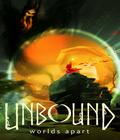The side-scrolling, platform puzzle genre has gotten popular due to the indie game boom. The ability to shift time and dimensions is nothing new, as several titles do something similar, like Seasons After Fall. Unbound: Worlds Apart doesn't add anything new to the genre, but it does a good job of blending the concepts together.
The story is going to be familiar to some fantasy fans. You play the role of Soli, the younger brother of a mage who's an important figure in conducting the group's various ceremonies. On this fateful day, the ceremony opens a portal to a world of vicious creatures that wreck the town and kill your brother. It falls on you to rescue whomever may still be alive and stop the threat before it gets worse.
Unbound starts with you having some basic abilities. You can run, jump, and climb up vines and walls. You can also talk to people for clues about what to do and where to go. Once you find your first obelisk, you can perform fast-travel, which becomes very useful when you reach areas that are a chore to double back through.
Once you can fast-travel, the game starts to open up. At first, you'll be able to conjure standing portals that shift a specific spot into a different world; it's useful for uncovering platforms or making roadblocks disappear. Get a little further into the game, and the portal can follow you around, and you can flip gravity. Later on, in a completely different area, the portal becomes a flashlight that's only active when you stay still.
All the while, Unbound uses these mechanics to play around with platforming puzzle elements by having you switch the portals on and off to make jumps or reach a floor that's only visible when the portal is off. Thus far, the puzzles aren't revolutionary, but they're pulled off well enough that most people won't mind.
While the idea of the same portals giving you different abilities in different areas is intriguing, it's too early to tell if the game has anything else in store. The description promises a Metroidvania-style, non-linear adventure, but the limited scope of the demo doesn't demonstrate how that'll work. The control scheme shows that abilities can be activated, such as a dash, so its absence in the demo points to some kind of progression as you delve further into the journey, but until we see more of the game, it's all rather vague.
Presentation-wise, the hand-drawn presentation stands out positively, even in a sea of games that use the same technique, and the particle effects from the portal are also quite good. The sound is where the game shines the most, as the soundtrack has a low-key epic adventure vibe that's present but not invasive. The game lacks voices, and the sound effects are fine, but we'll need to see and hear more to determine if those first impressions carry over to the end.
We're still a year away from Unbound: Worlds Apart releasing, but what we've seen so far in the prologue feels promising. The platforming puzzles feel good, while the quick respawn system ensures that death isn't too punishing. The portal system is put to good use by making it multifunctional instead of handling one gimmick, and the game's presentation is nice overall. There's still a long way to go for this one, but we're intrigued to see how it progresses in the next year.
More articles about Unbound: Worlds Apart













 Unbound: Worlds Apart is an atmospheric puzzle-adventure featuring a gorgeous and evocative world and a unique dimension-shifting mechanics.
Unbound: Worlds Apart is an atmospheric puzzle-adventure featuring a gorgeous and evocative world and a unique dimension-shifting mechanics.






